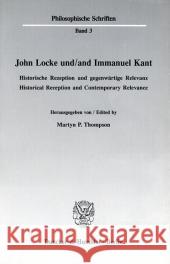John Locke Und / And Immanuel Kant: Historische Rezeption Und Gegenwartige Relevanz / Historical Reception and Contemporary Relevance » książka
topmenu
John Locke Und / And Immanuel Kant: Historische Rezeption Und Gegenwartige Relevanz / Historical Reception and Contemporary Relevance
ISBN-13: 9783428072064 / Niemiecki / Miękka / 1991 / 426 str.
John Locke Und / And Immanuel Kant: Historische Rezeption Und Gegenwartige Relevanz / Historical Reception and Contemporary Relevance
ISBN-13: 9783428072064 / Niemiecki / Miękka / 1991 / 426 str.
cena 476,56
(netto: 453,87 VAT: 5%)
Najniższa cena z 30 dni: 472,50
(netto: 453,87 VAT: 5%)
Najniższa cena z 30 dni: 472,50
Termin realizacji zamówienia:
ok. 10-14 dni roboczych.
ok. 10-14 dni roboczych.
Darmowa dostawa!
Kategorie BISAC:
Wydawca:
Duncker & Humblot
Seria wydawnicza:
Język:
Niemiecki
ISBN-13:
9783428072064
Rok wydania:
1991
Ilość stron:
426
Oprawa:
Miękka
Wolumenów:
01
Dodatkowe informacje:
Wydanie dwujęzyczne
Bibliografia
Bibliografia











